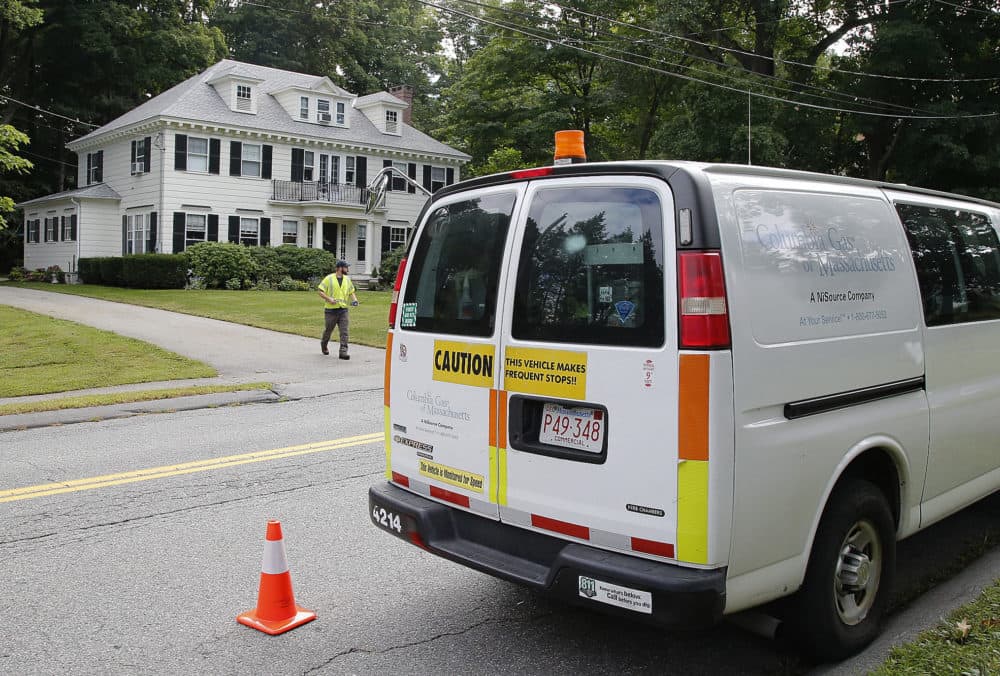Advertisement
State Issues A Moratorium On Columbia Gas Work — Apart From Merrimack Valley Restoration

A federal report into the Sept. 13 Merrimack Valley gas disaster does not provide enough information to indicate if Columbia Gas should be allowed to continue operating in Massachusetts, Sen. Edward Markey said Friday, just hours before state officials made the company the second this week to face a work moratorium.
The National Transportation Safety Board on Thursday released its preliminary report into the explosions and fires that left one man dead and damaged 131 structures across Lawrence, North Andover and Andover, finding the incidents occurred "after high-pressure natural gas was released into a low-pressure gas distribution system." The board said plans developed by Columbia Gas to replace an old cast-iron natural gas distribution main with a new plastic one in South Lawrence, and a crew working off those plans, did not account for the location of a sensor designed to maintain appropriate pressure in the system.
The state Department of Public Utilities on Friday ordered Columbia Gas to impose a moratorium on all work, except for emergency and compliance work, across its service territory until at least Dec. 1. Columbia is aiming to have gas service restored to Andover, Lawrence and North Andover by Nov. 19.
Peter Lorenz, a spokesman for the Executive Office of Energy and Environmental Affairs, said the moratorium "will not impede the emergency restoration services in the Merrimack Valley and allows the DPU to approve additional work upon request by the company."
After a gas scare on Monday in Woburn, the DPU on Oct. 8 ordered a similar moratorium on gas work by National Grid, pending a review of that company's safety practices. About 1,200 unionized National Grid gas workers have been locked out since June.
National Grid provides gas service to approximately 908,000 customers in 116 cities and towns in Massachusetts.
Columbia Gas provides natural gas service to more than 313,000 customers in 65 cities in towns, including the cities of Springfield, Brockton and Lawrence.
Markey, in a press conference at his Boston office, said many questions remain a day after the report's release, including why it took three hours to shut down critical valves, whether first responders were initially informed by residents or the company, and why there were not fail-safes that kicked in to prevent the disaster. He said he hopes to delve into these issues at a November congressional hearing in the Merrimack Valley.
Advertisement
"The NTSB still hasn't given us the answers which we need to know about the operations of Columbia Gas, but it's pretty clear that Columbia Gas was not prepared, that Columbia Gas was scrambling, was making it up as they were going along in responding to this crisis," Markey said. "So I think that's going to be a big question going forward that they must answer: Do they have the capacity, do they have the wherewithal in order to provide a safe transmission of natural gas inside of the commonwealth of Massachusetts?"
Markey serves on the Senate Committee on Commerce, Science and Transportation, which has jurisdiction over the NTSB and the agency that oversees pipeline safety. He said those two agencies will be asked what new measures must be put in place "to make sure that we never see another disaster like this."
"The same way that we had to pass new laws after the BP oil spill, after the Three Mile Island nuclear disaster, we're going to have to pass new laws to make sure that safety is first, that it's not short-changed because a corporation doesn't want to spend the money it should to ensure there is safety built into the system right from the beginning," Markey said.
NiSource, the parent company of Columbia Gas, said it is fully cooperating with the NTSB as the investigation continues.
"As a party to the NTSB investigation, we are prohibited from discussing or speculating on the cause of the incident or facts related to it until the NTSB has completed its work," NiSource President and CEO Joe Hamrock said. "However, we can say that, because safety is our top priority, in the hours immediately after the incident we suspended similar work and enhanced procedures related to our low pressure systems. We saw these as responsible steps to take in the aftermath of the incident and while the facts were being gathered."